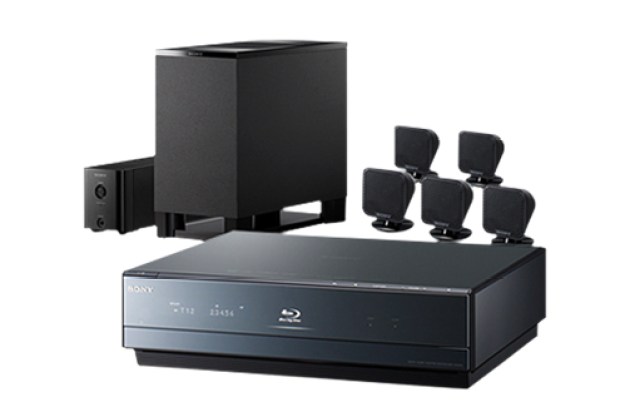
“A great home theater hampered by one tiny little problem: We couldn't get the wireless surround speakers to work.”
- Beautiful design and a small footprint; clear powerful subwoofer; supports HD audio formats and BD Profile 2.0; 2 HDMI inputs
- Wireless rear speakers didn't work; adaptor required for certain types of external components
Summary
Blu-ray home-theater-in-a-box (HTIB) systems are still a rarity—there are currently only a few models available from Panasonic, Samsung and Sony. What’s more, they’re pricey. Sony’s BDV-IS1000 lists for $1,000, keeping it just outside the realm of most mainstream consumers. But the biggest hurdle, as we found out, is simply that they don’t always work. Despite trying two systems, spending an hour on the line with a support specialist, and about half that time again on a conference call with a product manager, we were unable to make the system’s rear wireless speakers connect with the main amplifier. Other than that one, rather significant inconvenience, it’s a sweet system.
Design

The 200-watt subwoofer is attractive, too—or at least as attractive as a big black box can be. The driver is held suspended a couple of inches above the ground by four stilts that raise from the base platform, while the up-firing speaker is set into the top surface and surrounded by glossy ebony plastic.

Performance
An automatic surround calibration mic helps keep setup time at a minimum—assuming everything works as it should. We followed the setup instructions to the letter, but upon powering up the system we could not establish a connection between the main amplifier and the surround amplifier.
The two devices are supposed to communicate via Sony’s S-AIR wireless protocol. Ideally, all users should have to do to create a connection is snap a pair of wireless transceivers into the amplifier; they’re supposed to find each other automatically in a matter of seconds. That wasn’t our experience.
We dove into Sony’s user guide (which is clumsily written by someone for whom English does not come naturally) and tried all of the troubleshooting tips, but to no avail. An hour-long call with a Sony support specialist, who took us through all of the various fixes we’d already tried—such as switching wireless IDs on both devices, shutting down other potential sources of radio interference, and moving the units closer together—did no good.
Eventually, Sony sent us a second system… and we encountered the exact same problem.
Of course, it’s possible that we may have missed some obscure, undocumented detail in setting up the system, but that would mean Sony’s support specialist who had been trained on the product wasn’t aware of the detail either—and, more importantly, that average users would likely miss it as well. Indeed, try Googling user reviews of the system and you’ll find several in which the writers describe an issue identical to the one we encountered.
However, if you do decide to go with the BDV-IS1000 and wind up encountering similar problems, you’ll have telephone access to a Sony support specialist who will provide details on how to have the unit exchanged or repaired under Sony’s one-year warranty.
With the rear speakers out of commission, we were forced to evaluate the system’s audio performance based solely on its center, right and left channels. And while these three tiny cones outputted satisfyingly clear and sophisticated sounds (the tinkle of glass from a broken window in The Dark Knight gave the impression that the pane had been shattered in our living room), the lack of rear channels kept us from being fully immersed in the film’s audio.

The Blu-ray player is commendable, too. Ethernet connectivity enables Blu-ray Profile 2.0 features, and the unit supports both DTS-HD Master Audio and Dolby TrueHD high-def audio formats. Loading times were sometimes a tad sluggish relative to other recent players we’ve tested, but the picture was rock solid.
What’s more, Sony’s Precision Cinema upscaler noticeably improved the picture quality of our standard-definition copy of Speed Racer. However, it still paled in comparison to its Blu-ray counterpart—large patches of skin appeared blurred and the edges of the film’s in-focus cars often lacked crisp definition—evidence that it’s hard to go back once you try Blu-ray on a quality 1080p television.
Features
The BDV-IS1000 has plenty of nice perks, starting with a pair of HDMI inputs, which means you can run your game console, video camera, or any other HD device you might have through the main amp. There are also optical digital and analog inputs for cable and satellite receivers, as well as antennas for FM and AM radio reception. You can even stream audio from a computer or Bluetooth enabled device to the system, though you’ll need to pick up one of Sony’s digital media port adaptors to do it.

The intuitive cross-bar menu system (Sony’s horizontal menu bar designed to make the most of widescreen displays) will be familiar to anyone who has ever powered up a . A wide range of settings, from manual speaker configurations to advanced wireless pairing operations (which, as you might guess, we became very familiar with), are easily accessible.
The remote is a standard but well-designed little monolith of user empowerment. Everything has been clearly labeled, and most buttons are smartly positioned. Commonly used controls feature tactile references (bumps, indentations, etc.) to make them easy to locate in dark, though rear lighting would have been better.
Consumers who have outfitted their homes with Sony products will appreciate support for one-touch BRAVIA Sync (Sony’s flavor of the industry’s Control for HDMI mutual control standard), which allows users to manage all of their components with the home theater remote.
Conclusion

Pros:
- Beautiful industrial design and a small footprint
- Clear, powerful subwoofer
- Supports high-definition audio formats and BD Profile 2.0
- 2 HDMI inputs
Cons:
- Wireless rear speakers didn’t work on either of our test units
- Adaptor required for certain types of external components



